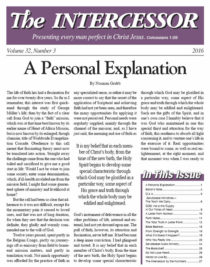
Q & A
Question:
If we, as you state, “have never been independent, self-relying selves…” then who is to blame for our sin?
Answer:
Firstly, we are all slaves, either to righteousness (Christ) or sin (Satan)–See Romans 6. We are only responsible for who operates us. The sin deeds or righteous deeds that are a result of that choice, belong to our owner/master.
In plain terms, we only have one choice–to believe God, and what He says about us (“…he who is joined to the Lord is one spirit with Him” 1 Cor. 6:17, “I am the Vine you are the branches” John 15:5) or not. As born-again believers, if we do believe what God says about us, Christ lives out through our members (Vine-branch-John 15:5). If we do not believe what God says about us, we are committing the sin of unbelief (“For whatsoever is not of faith is sin” Rom. 14:23). This gives Satan control of my members/soul-body. He can then misuse me to live out his sin deeds–“Ye are of your father the devil and the lusts of your father ye will do” (John 8:44).
So–who is responsible for sin? I am responsible for the sin of unbelief (about who I am/God says I am). But Satan is responsible for the sin deeds that he lives out once I give him control “Know ye not, that to whom ye yield yourselves servants to obey, his servants ye are; whether of sin unto death, or of obedience unto righteousness?” Rom. 6:16.
I hope this helps. If you want to read more, here are some relevant quotes from Page Prewitt’s booklet: “Life: The What, The Who, The Why” and Norman Grubb’s book Yes, I Am:
“The Bible simplifies sin when it makes the bare bones statement that everything not of faith is sin (Rom. 14:23). Or to put it another way, all unbelief is sin. (Unbelief means that we do not believe what God says about us–that as Christians we are joined to Christ, and He is one spirit with us). In view of this fact, the first thing Satan must accomplish in his effort to get any believer to commit a sinful deed is to tempt him and get him to believe he is an independent self-operating self. In other words, to see himself as an “alone I” or “just me.”
When/If Satan is able to lure us by this lie into the sin of unbelief, he gains the power to boss us on the soul-body level and lead us into any sin deeds he chooses. Our union with Christ is not broken; however, our sin temporarily blocks the Holy Spirit from living through us.
The good news is that we can avoid the Satan sin trap by simply remembering and, if necessary, stating the truth that thoughts and feelings are not the real us. They are factual but not real in the eternal Spirit sense. This is the way the Bible says it: The things that are seen are temporarl [fleeting] and the things that are not seen are eternal [everlasting] (2 Cor. 4:18).”
–”Life: The What The Who, The Why,” by Page Prewitt
Pages 17 – 18
————————————————————-
“‘You are of your father the devil, and the lusts of your father you will do.’ When I read that, my eyes were opened to the second phrase as well as the first. The first says that we humans–all of us who have not yet become children of God by faith in Jesus Christ–have Satan, not God, as our father. But the second phrase especially struck me: ‘…the lusts of your father you will do.’ Not that we are doing our own lusts, but the lusts of our father. Then all we are doing as humans is not a product of some supposed human fallen nature, but actually Satan himself expressing his own lusting nature by us! All we are, therefore, is merely the outer expression of this spirit of error, this god of this world, living his own Satan-form life by our humanity. That was revolutionary. I had always thought I was fulfilling my own natural desires; but not so, because we have no nature of our own. We have all been fulfilling the lusts of the god of self-centeredness, and what we think are just our sins are ours only in the sense that we are joined to Satan as branch to false vine, expressing his thoughts and deeds. So when the Bible says ‘All have sinned,’ the real inner truth is that the sinner is Satan, and we in a secondary sense are participating in his sinning.”
—Yes, I Am, by Norman Grubb
Page 52





